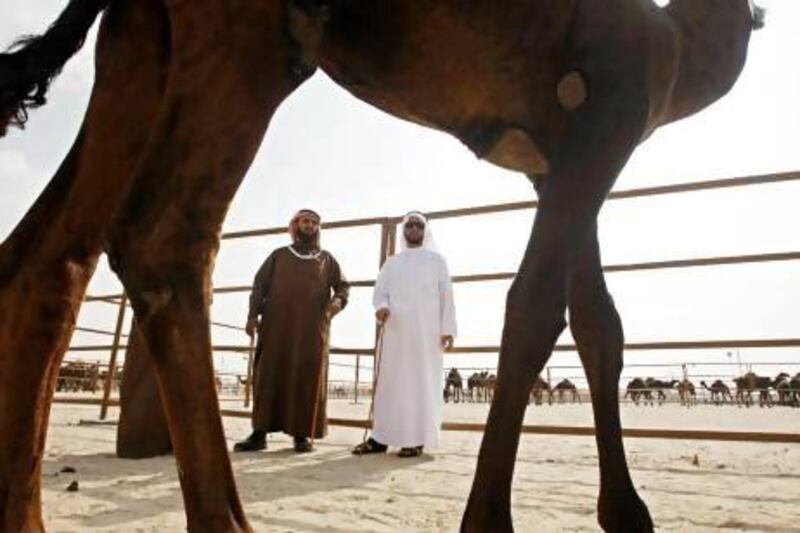ABU DHABI // A long nose, a skinny neck, droopy lips, thick legs, big feet and a hump perfectly placed on her lower back: Wadibich has it all.
The camel's owner, Mussalim Al Amri, travelled throughout Saudi Arabia to choose her from hundreds of candidates. In his eyes, her beauty is perfection.
When she arrived in the small central Abu Dhabi city of Madinat Zayed, it may not have seemed like a big career break. Yet the fame of this Saudi-born camel grew within weeks. By the second day of the Al Dhafra Festival, the two-year-old had attracted a cheering crowd from Madinat Zayed who called her their own.
The air filled with ghutras hurled aloft in triumph when Wadibich was chosen the top muhajim (black) camel in her age group.
Would her owner ever sell her?
"Never," said Mr Al Amri.
Within seconds of his victory, his phone rang.
Within minutes, he had an offer of Dh3.7 million for Wadibich: not a bad return on his investment - he paid Dh900,000 for her just last month.
A small group of men remained quiet. As the crowds danced, they disappeared into a temporary majlis, exhausted from the day's work.
They are the camel judges, and their opinions are both feared and admired.
Decisions do not always get such loud approval as greeted the win for Wadibich.
In a world of great emotion, the judges must be immune to the crowd's reaction. It is their job to remain stoic, steadfast and detached. They judge hundreds of camels within hours. They can make a camel a celebrity or dash a tribe's hope within seconds.
"We don't work to make them happy," said Humaid Senan, a judge in his 50s from the Abu Dhabi town of Ghayathi. "That is not the responsibility of the judges. The people give us the camels to decide."
The six judges present a unified front to the public. The subjective nature of beauty means that all decisions have to be unanimous. If disagreements exist, they are not discussed. They share one scoresheet and all must sign its approval.
They move in a huddle through the competitor pens, dismissing a camel's years of training with the flick of their narrow canes.
"People don't want advice," said Mr Ahmed Mohammed, 40, a judge from Madinat Zayed. "They want profit."
Beauty is in the eye of the beholder, but camel beauty is universal.
"A beautiful camel is the same in every country," said Shakhbut Al Dossary, a Saudi Arabian trader who has worked as a beauty judge for 15 years in Saudi Arabia and five in Al Dhafra.
Mr Al Dossary is the only non-Emirati judge at the festival.
As a professional, he will not reveal his favourite competitors.
"Every year there's another beautiful camel," said Mr Al Dossary. "In my memory, there are many."
Temperament and grace are the most important qualities, worth 15 out of 100 points.
"If the camel is angry they don't see how it is beautiful," said Hamdan Al Mazrouei, 18, a judging apprentice from Madinat Zayed.
Physical characteristics are worth five points each.
Pressure for perfection is strong. A team of three reviews all finalists to make sure the camel's beauty is God given.
"There are drugs to make their lips drop or some pull the lips by hand," said Mr Al Dossary. "They colour the face to make it darker. These are all ways to cheat."
More cheats prefer deceit by pedigree. They mate Arabian breeds with larger Sudanese and Pakistani camels.
Entrants can be asked to present the camel's parents for DNA testing.
All competitors must swear on the Quran about the camel's age and ownership. Camels are judged by age, and for them, old is beautiful. Size and maturity are an advantage. One of the biggest beauties in festival history was Mabrukan, an aged majahim camel who sold for Dh15m in 2008.
"And there were many camels that sold for Dh10m," said Mr Senan.
Mabrukan's nephew, the camel Ghaouda, sold for Dh9m on Saturday.
Today the three-year-olds will be judged.
"It's always a surprise," said Hamed Al Hajjari, 25, a spectator who travelled 200 kilometres from Al Rahba to see Wadibich. "It's special but too many people have the same camel. Everybody has a beautiful camel."






